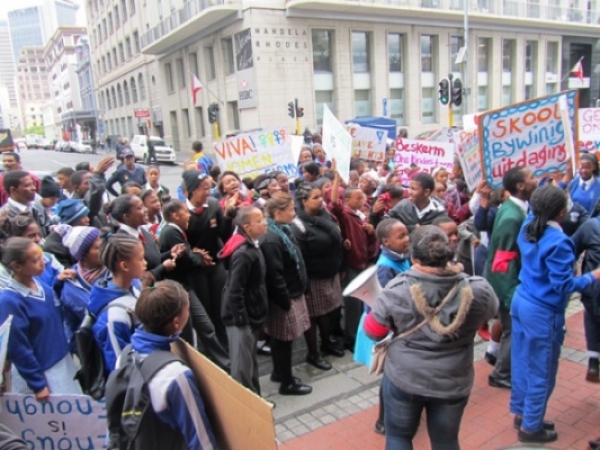The dark and dangerous road to school rural children face

About 200 pupils from farm schools in Wolseley, Stellenbosch, Wellington and Grabouw handed a memorandum to the Western Cape Education Department on Monday. The demonstration was organised by Women on Farms Project.
“We are here to tell the Western Cape Department of Education (WCED) about farm school transport. Pupils walk for about an hour to get to school. On their way, they encounter many dangers ranging from being raped, robbed or assaulted,” said Colette Solomon, Director of Women on Farms Project.
“These pupils are unable to participate in extramural activities in the afternoon while their counterparts in town enjoy these hours. There is only one particular bus per school that takes the pupils home immediately after class lessons end.”
Pupils were singing and chanting while waving placards mostly written in Afrikaans.
“I am saying to the WCED that they must give us transport,” said Sirethemba Ntshhweza, age 17, from Scottsdene High School, Kraaifontein. “We have gone for a period without reliable transport. Officials here drive expensive cars. They are only thinking about themselves and their families. What about us? We are the future of this nation …They must take responsibility.”
“Enough is enough. I go to school using trains. We at times get robbed. We do not have any protection, yet these officials are protected 24 hours. This makes me angry.”
A boy from Wolseley, who did not want his name published, said, “Please, we need buses. When we cross railway lines … when the train appears we do not know what to do.”
Receiving the memorandum, Mpumelelo J Hendricks, Deputy Director Learner Transport Scheme for the WCED, said, “I have been listening to your difficulties and challenges that you are facing. I will receive the memorandum and communicate your concern to the department. You can be assured that the department will take the correct action so that you have access to a better transport system.”
Pupils demanded to know when they could expect a response. Hendricks assured them of a response within four weeks.
Speaking after the demonstration, Karen Roos from Women’s Health and Empowerment said, “We have noted with concern that there are many pupils dropping out of school … We decided to dig and discovered that children walk to school during dark morning hours. They travel for almost an hour to school … The state bus system is not working. The buses are usually not in good condition and are overloaded. At times, the bus drivers smell of alcohol.”
Roos says if the department does not respond to the memorandum then it means a harder stance will have to be taken.

This article is licensed under a Creative Commons Attribution-NoDerivatives 4.0 International License.


